On February 16-17, 2017, RFA welcomed the inaugural cohort of 14 What Works Nonprofit Fellows to Washington, D.C., to discuss the best ways to advance evidence-based policy at all levels of government and find solutions to some of our communities’ toughest challenges. During the Convening, our Fellows shared some personal stories and some of the reasons why they support #WhatWorks. Check back weekly for new stories and great photos!
RFA What Works Nonprofit Fellow Plinio Ayala, President & CEO, Per Scholas
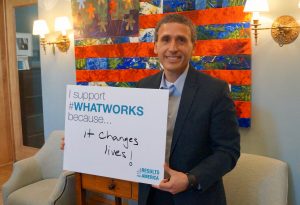
“I have learned that to be successful placing our graduates in quality jobs with opportunities for career advancement we must measure our own impact. These data points – graduation rates, placement numbers, career growth and retention – inform small and large decisions. We invest in software and employee training to measure these outcomes, however, we have also participated in two separate third party research studies to assess our model. Each decision to launch a new training track or build a new employer partnership is greatly informed by more than twenty years of experience and the data we collect every day.” – RFA What Works Nonprofit Fellow Plinio Ayala, President & CEO, Per Scholas
RFA What Works Nonprofit Fellow Molly Baldwin, Founder & CEO, Roca Inc.
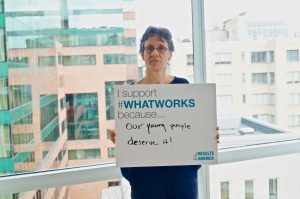 “I support #whatworks. If we don’t collect data and track our efforts to help young people, how will we know if what we do matters?” – RFA What Works Nonprofit Fellow Molly Baldwin, Founder & CEO, Roca Inc.
“I support #whatworks. If we don’t collect data and track our efforts to help young people, how will we know if what we do matters?” – RFA What Works Nonprofit Fellow Molly Baldwin, Founder & CEO, Roca Inc.
RFA What Works Nonprofit Fellow Dr. Robert Balfanz, CEO, Diplomas Now
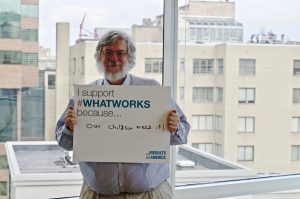
“Time and resources are limited and we owe it to our children to use them wisely by supporting and following #WhatWorks.” – RFA What Works Nonprofit Fellow Dr. Robert Balfanz, CEO, Diplomas Now
RFA What Works Nonprofit Fellow Dale Erquiaga, CEO, Communities in Schools
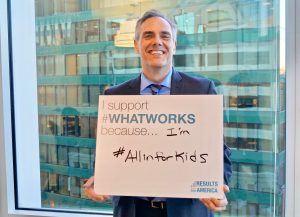 “As a leader of a youth serving organization, I take seriously the charge of helping steward the future of millions of young people in this nation. There are 14.5 million kids who live in poverty, in order to help them, we must collaborate with other nonprofits to build and use evidence to improve youth development and provide an example to policymakers at all levels.
“As a leader of a youth serving organization, I take seriously the charge of helping steward the future of millions of young people in this nation. There are 14.5 million kids who live in poverty, in order to help them, we must collaborate with other nonprofits to build and use evidence to improve youth development and provide an example to policymakers at all levels.
Kids are kids, and they show up every day the best way they know how. It is our responsibility to do the same and lead a movement of organizations who are equipped to help them succeed in school and in life to help them reach their full potential.” – RFA What Works Nonprofit Fellow Dale Erquiaga, CEO, Communities in Schools
RFA What Works Nonprofit Fellow Pam Cantor, President & CEO, Turnaround for Children
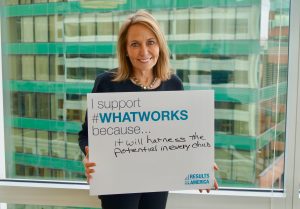 “The story of human potential presented by the human sciences—biological, psychological and developmental—gives reason for optimism. When the contexts we expose children to nurture their development, children thrive. But when these environments are filled with stress and adversity, with few adults to buffer that stress, children will struggle to fulfill their potential. Instead of asking children to beat the odds, let’s use the science of human development to prove that we can change the odds for many more children.” – RFA What Works Nonprofit Fellow Pam Cantor, President & CEO, Turnaround for Children
“The story of human potential presented by the human sciences—biological, psychological and developmental—gives reason for optimism. When the contexts we expose children to nurture their development, children thrive. But when these environments are filled with stress and adversity, with few adults to buffer that stress, children will struggle to fulfill their potential. Instead of asking children to beat the odds, let’s use the science of human development to prove that we can change the odds for many more children.” – RFA What Works Nonprofit Fellow Pam Cantor, President & CEO, Turnaround for Children
RFA What Works Nonprofit Fellow Sam Cobbs, CEO, First Place for Youth
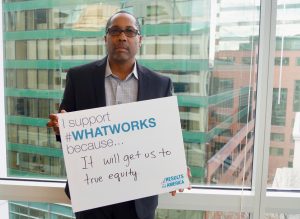 “In 2005, when I arrived at First Place, we adopted a mantra of “ what about the other 15?” We can pat ourselves on the back when we have a success rate of 85% of our young people maintaining a safe, stable home after exiting our program. But for us, we’re worried about the other 15%. What can we do to reach those young people, to ensure they have a successful outcome? That’s why I got involved in the evidence and data movement, to make sure we’re helping as many young people as possible with the best possible outcomes: safe housing, high school completion, college, and meaningful employment.” – RFA What Works Nonprofit Fellow Sam Cobbs, CEO, First Place for Youth
“In 2005, when I arrived at First Place, we adopted a mantra of “ what about the other 15?” We can pat ourselves on the back when we have a success rate of 85% of our young people maintaining a safe, stable home after exiting our program. But for us, we’re worried about the other 15%. What can we do to reach those young people, to ensure they have a successful outcome? That’s why I got involved in the evidence and data movement, to make sure we’re helping as many young people as possible with the best possible outcomes: safe housing, high school completion, college, and meaningful employment.” – RFA What Works Nonprofit Fellow Sam Cobbs, CEO, First Place for Youth
RFA What Works Nonprofit Fellow Ed Foster-Simeon, CEO, U.S. Soccer Foundation
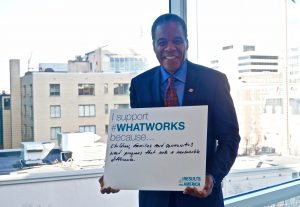
“Children, families and communities deserve access to high-quality programming. To make this a reality, we must use data to evaluate our work. Whether it’s improving health outcomes among participants or fostering positive social outcomes, we only know the program works if we have data to prove it. Programs that make a measurable difference create lasting, positive change in communities.” – RFA What Works Nonprofit Fellow Ed Foster-Simeon, CEO, of U.S. Soccer Foundation
RFA What Works Nonprofit Fellow Lauren Gilbert, President and Chief Strategy Officer, BELL
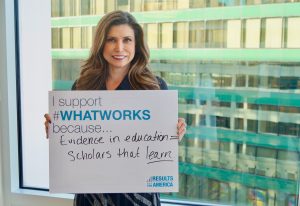
“We share a collective responsibility to ensure that we are creating ladders of opportunity to eliminate the achievement gap. Yet, too many of our youth are falling behind simply due to not having access to evidence-based summer programs. Evidence serves as a foundation of knowledge to draw upon, enabling us to strengthen areas that work and fine-tune areas that need to be optimized. Ensuring that programs are data-driven will help us fulfill our promise of providing real opportunity and real results for children living in under-resourced communities.” – RFA What Works Nonprofit Fellow Lauren Gilbert, CEO, BELL
RFA What Works Nonprofit Fellow Virgil Jones, CEO, Bottom Line
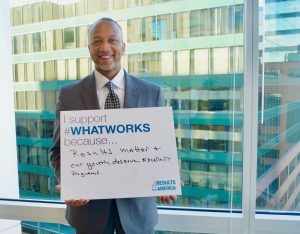 “Across the country, millions of dollars have been invested in intensive college advising programs as a strategy to increase the share of low income students who enroll in college and earn a degree. Yet, there is very little rigorous evidence evaluating the unique impact that these programs have on student outcomes. We believe that the use of data and evidence is imperative for us, our stakeholders, partners, higher education institutions and the students whom we serve to know that our work leads to successful outcomes! As leaders, we have a responsibility to evaluate our work to ensure we achieve the intended outcomes for our students. They deserve it!” – RFA What Works Nonprofit Fellow Virgil Jones, CEO, Bottom Line
“Across the country, millions of dollars have been invested in intensive college advising programs as a strategy to increase the share of low income students who enroll in college and earn a degree. Yet, there is very little rigorous evidence evaluating the unique impact that these programs have on student outcomes. We believe that the use of data and evidence is imperative for us, our stakeholders, partners, higher education institutions and the students whom we serve to know that our work leads to successful outcomes! As leaders, we have a responsibility to evaluate our work to ensure we achieve the intended outcomes for our students. They deserve it!” – RFA What Works Nonprofit Fellow Virgil Jones, CEO, Bottom Line
RFA What Works Nonprofit Fellow Pat Lawler, CEO, Youth Villages
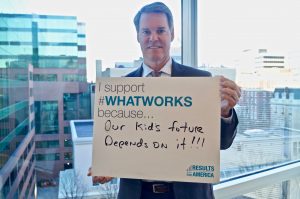 “Youth Villages’ goal has always been to provide the best services for children and families. That’s why we started collecting data, using measurement, benchmarking and total quality improvement. It was all about getting better outcomes for youth. We didn’t realize how valuable our data could be until the mid-‘90s when some of our state funding was at risk. Using our data, we were able to convince the state to spend money for in-home services and develop a continuum of care — because we had such good data to show them what worked and how much more cost-effective it was.” – RFA What Works Nonprofit Fellow Pat Lawler, CEO, Youth Villages
“Youth Villages’ goal has always been to provide the best services for children and families. That’s why we started collecting data, using measurement, benchmarking and total quality improvement. It was all about getting better outcomes for youth. We didn’t realize how valuable our data could be until the mid-‘90s when some of our state funding was at risk. Using our data, we were able to convince the state to spend money for in-home services and develop a continuum of care — because we had such good data to show them what worked and how much more cost-effective it was.” – RFA What Works Nonprofit Fellow Pat Lawler, CEO, Youth Villages
RFA What Works Nonprofit Fellow Mary Marx, President and CEO, Pace Center for Girls
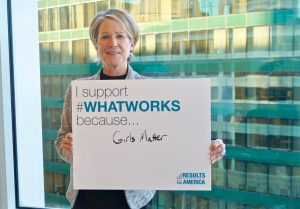 “I believe in the power of data and evidence to improve lives because better understanding the needs of our girls and their families, and more effectively meeting these needs, will better prepare our girls to be tomorrow’s mothers, workforce and community leaders. Looking forward, our nation’s future depends on our girls and right now, they depend on us, so we must know what works and act on what works and get it right.” – RFA What Works Nonprofit Fellow Mary Marx, President and CEO, Pace Center for Girls
“I believe in the power of data and evidence to improve lives because better understanding the needs of our girls and their families, and more effectively meeting these needs, will better prepare our girls to be tomorrow’s mothers, workforce and community leaders. Looking forward, our nation’s future depends on our girls and right now, they depend on us, so we must know what works and act on what works and get it right.” – RFA What Works Nonprofit Fellow Mary Marx, President and CEO, Pace Center for Girls
RFA What Works Nonprofit Fellow Sam Schaeffer, CEO, Center for Employment Opportunities
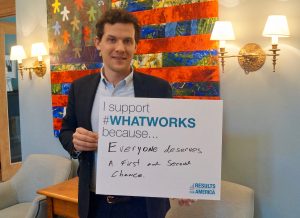 “Over 600,000 people return home from prison every year and too many will struggle to find employment to support themselves and their families. The men and women CEO works with every day are at the center of our mission. To address this national challenge – and break cycles of intergenerational poverty and incarceration – the consistent use of evidence and data is absolutely critical. Data and evidence allow us to serve each individual with quality, constantly improve CEO’s program and bring our efforts to scale around the country.” – RFA What Works Nonprofit Fellow Sam Schaeffer, CEO, Center for Employment Opportunities
“Over 600,000 people return home from prison every year and too many will struggle to find employment to support themselves and their families. The men and women CEO works with every day are at the center of our mission. To address this national challenge – and break cycles of intergenerational poverty and incarceration – the consistent use of evidence and data is absolutely critical. Data and evidence allow us to serve each individual with quality, constantly improve CEO’s program and bring our efforts to scale around the country.” – RFA What Works Nonprofit Fellow Sam Schaeffer, CEO, Center for Employment Opportunities
RFA What Works Nonprofit Fellow Elisabeth Stock, CEO, PowerMyLearning
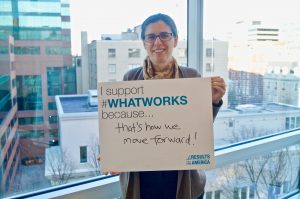 “At PowerMyLearning, we help teachers, families and students use data for continuous improvement in order to drive strong student outcomes. Data helps teachers improve their instruction, support student agency, and strengthen the home-school connection. Data helps families become better learning partners at home. Data helps students track their success and take charge of their learning. But the idea of data for continuous improvement does not stop there. It also applies to us at the organization level. Once all of us use data for continuous improvement we will produce a real meaningful shift in student success.” – RFA What Works Nonprofit Fellow Elisabeth Stock, CEO, PowerMyLearning
“At PowerMyLearning, we help teachers, families and students use data for continuous improvement in order to drive strong student outcomes. Data helps teachers improve their instruction, support student agency, and strengthen the home-school connection. Data helps families become better learning partners at home. Data helps students track their success and take charge of their learning. But the idea of data for continuous improvement does not stop there. It also applies to us at the organization level. Once all of us use data for continuous improvement we will produce a real meaningful shift in student success.” – RFA What Works Nonprofit Fellow Elisabeth Stock, CEO, PowerMyLearning
RFA What Works Nonprofit Fellow Eshauna Smith, CEO, Urban Alliance
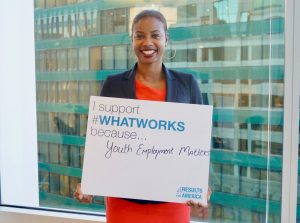
“Youth employment matters because our youth matter. Across the country, 5.5 million youth are disconnected from school and work. At Urban Alliance, we’re focusing on #whatworks to bring paid internships and professional experience to young people in need. I’m living proof that youth employment matters – I wouldn’t be here today if not for my first paid internship.” – RFA What Works
Nonprofit Fellow Eshauna Smith, CEO, Urban Alliance